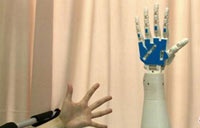China makes progress in brain-computer interface study
(Xinhua) Updated: 2014-08-26 14:20HANGZHOU -- Chinese scientists have made progress in brain-computer interface research after a successful experiment on an epilepsy patient.
After implanting an electrode connected to a robotic hand into the brain of a 28-year-old woman, the hand performed the three actions of the rock-paper-scissors game immediately after the patient.
| Trending: Zhejiang scientists help disabled |
This shows China's progress in brain-machine interface, bringing new hope to patients who suffer limb motor dysfunction, said Zhang Jianmin, head of the neurology department at the second hospital affiliated to Zhejiang University.
The Chinese team began their research in 2006 and in 2012 realized actions such as grasping and pinching of a robotic limb in an experiment on a monkey.
Researchers will work to improve the accuracy of the action of robotic limbs, said Zhang.
- Govt encourages people to work 4.5 days a week
- Action to be taken as HIV cases among students rise
- Debate grows over reproductive rights
- Country's first bishop ordained in 3 years
- China builds Tibetan Buddhism academy in Chengdu
- Authorities require reporting of HIV infections at schools
- Typhoon Soudelor kills 14 in East China
- Police crack down on overseas gambling site
- Debate over death penalty for child traffickers goes on
- Beijing to tighten mail security for war anniversary








